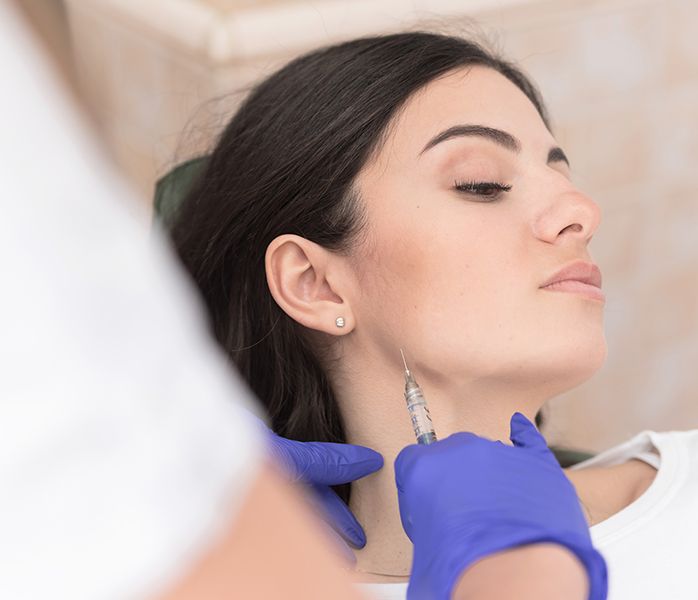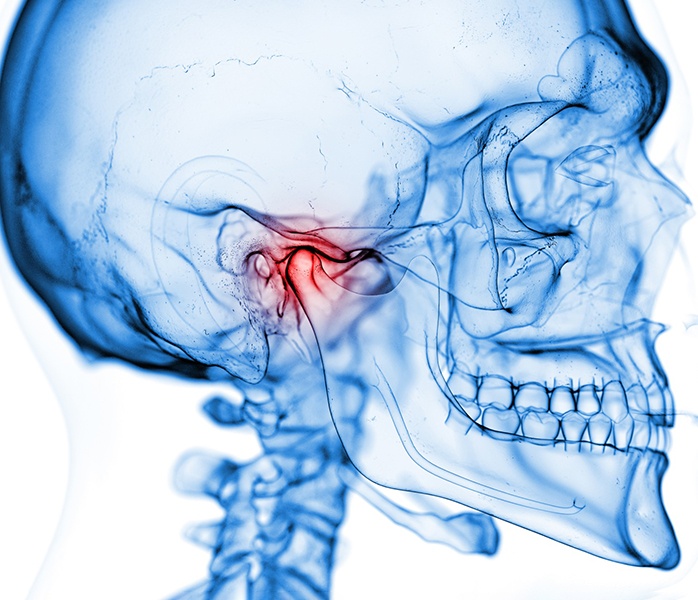


Do you find yourself constantly dealing with a stiff, painful jaw or migraine headaches? If so, both problems could actually stem from a strained or injured TMJ, or temporomandibular joint. This joint, located right in front of your ears, is what allows your jaw to move smoothly whenever you eat, speak, laugh or yawn. When a problem with this joint arises (known as a TMJ disorder or TMD), it can cause all kinds of chronic pain and dental problems, many of which people would never associate with the jaw. Fortunately, our dentist is trained to identify and treat these kinds of issues with TMJ therapy in Millersville, MD, so if you’re ready to get the relief you deserve, be sure to contact us today.

A TMD can stem from multiple causes, with the most common being stress, injury, arthritis, or a misalignment of the bite. Determining the exact reason of your TMD will help us figure out which treatment would be best. We’ll test the mobility of your jaw, look at your teeth, and use a variety of diagnostic images to figure out what is causing your discomfort. With this information, we’ll then put together a treatment plan to help you quickly eliminate your pain.

When the teeth do not properly come together when the mouth is closed, this can cause muscle tension in the TMJ, which can lead to all kinds of pain that can radiate throughout the face and jaw. To correct this, we can perform what is called an equilibration/occlusal adjustment. For this, we’ll slightly reshape a few key teeth so they can come together smoothly and allow the jaw to reach its natural resting position.

An occlusal splint is a type of mouthpiece that can also be used to help alleviate TMD-related pain. Each one is custom-made for every patient, and it works by slightly adjusting the jaw so that the TMJ is in a more natural and relaxed position, allowing the muscles and joint to heal themselves. A patient will only need to wear it to bed, and it can even help protect the teeth from unconscious teeth grinding (another common symptom of TMD).

When a patient is suffering from TMD, they often have to deal with small muscle spasms in their jaw as it is trying to adjust itself, and this is what can cause the pain and teeth grinding that are so prevalent with this condition. With a few strategically placed BOTOX injections, we can stop these spasms and help relieve their associated pain. The procedure itself only takes a few minutes, but the relief it provides can easily last for multiple months.

BOTOX is the brand name of a diluted form of a bacteria known as botulinum toxin. While the word “toxin” might sound a bit scary, this treatment actually has a long track record of safety. When it is strategically injected into the facial muscles around the jaw, it limits their movements. This forces them to relax and stops the painful muscle spasms and soreness that are associated with TMJ disorder.
The injections usually take just a few minutes to perform, and you may start to experience pain relief in a matter of days. The results can last for several months at a time.

BOTOX might be able to help you if you are experiencing common symptoms of TMD, including:
Please note that while BOTOX can do much to relieve symptoms of TMD, it does not address the root cause of the disorder. Therefore, it is often most effective when it is used in combination with other therapies.
If you would like to find out whether BOTOX might be a good fit for your unique situation, Dr. Tran and our team are ready to consult with you.

BOTOX forces the muscles around your jaw to relax, which can in turn promote pain relief, reduce teeth grinding, and even encourage high-quality sleep. Many patients have experienced excellent results with this approach to treatment. In fact, one study from 2012 found that BOTOX significantly decreased the pain associated with mouth movements for three months. A separate study found that BOTOX was helpful for 90% of patients with TMD symptoms.
Some patients come to us periodically for repeated BOTOX injections, typically every 3 – 6 months or so. Others find that they do not need additional injections because other TMD therapies have addressed their condition at its source.

Dr. Tran and our team are eager to help you find long-lasting relief from your TMD pain. Before you book your consultation, though, you might be curious about the road ahead. What can you expect with treatment? To help you in your quest to gather information, we have compiled a list of answers to some FAQs about TMJ therapy. If your specific questions are not addressed here, reach out to us directly so we can personally assist you.
TMJ treatment is extremely low-risk. In fact, therapies like occlusal adjustments and splints have consistently been shown to be safe. Other approaches, such as surgery, carry higher risks. As long as you entrust your care to a qualified medical/dental team, though, you can be confident that your treatment will be handled in the safest, most responsible manner possible.
The duration of your TMJ treatment will depend on which therapy you undergo and other unique details of your case. Some remedies, such as medications and exercises, can provide fast pain relief. However, since they do not address the underlying cause of the TMD, the benefits they provide are temporary at best. We strive to address the root cause behind our patients’ pain. We might direct you to wear an occlusal splint for several weeks to several months. An occlusal adjustment may provide relatively fast relief. BOTOX can take anywhere from a day or two to a couple of weeks to produce noticeable results.
We strive to make treatment as comfortable as possible for our patients. When we perform occlusal adjustments, we first focus on slightly modifying any crowns or other restorations that you have; we only modify your natural dentition if absolutely necessary. Depending on the specifics of your case, we might numb your mouth during your appointment. That is not always necessary, though. Your mouth might be sore for a few days after an occlusal adjustment. However, any discomfort should wear off fairly quickly.
The price of TMJ treatment depends on the details of your therapy plan. The less your treatment involves, the less it will cost. For example, BOTOX injections are much more affordable than major jaw surgery. During your consultation, we will be able to discuss specific numbers with you. We can also help you learn about provisions that might make your care easier to afford, including financing and insurance. Remember that even if your treatment seems a bit expensive, the pain relief it can bring will be truly priceless.
In some instances, the discomfort people feel from TMJ disorder can occasionally go away gradually by itself. That said, you’ll want to consider visiting a professional for treatment if your situation begins negatively impacting your daily life. Certain treatments for TMJ, such as BOTOX, often offer short-term pain relief, but you won’t expect the results to be permanent. Other solutions like occlusal splints and adjustments and equilibration are specifically designed to treat jaw tension, misalignment, and other TMJ-related complications entirely.
BOTOX, otherwise known as botulinum toxin, is produced by the Clostridium botulinum bacterium. While it might sound unsettling to have bacteria injected into a person’s face, the process is quite safe if administered with the proper dosage by a qualified TMJ professional. That said, there can be potential side effects of BOTOX, such as redness/bruising/soreness around the injection site, headaches, or even temporary drooping in the eyelids. Still, the risk of these symptoms is generally low, and the possible effects are usually short-lived.
Equilibration/occlusal adjustments can typically vary in how swiftly they offer relief, which can usually involve the specific changes that are necessary to make. Once a patient’s bite/teeth are more properly aligned, the majority of them tend to experience minor relief soon afterward. The length of the treatment process can also vary from person to person. For the most part, it might take anywhere from one to three appointments for your dentist to finish the necessary adjustments to your teeth or restorations so that you can have a more evenly distributed biting force. Each appointment is also relatively brief, so they shouldn’t take too much time from your daily schedule.
It’s quite possible for TMJ to be treated without having to undergo surgery. Furthermore, the National Institutes of Health actually recommends that patients use more conservative methods for addressing their situation before going for something more invasive. In most cases, surgery for TMJ is usually only suggested as a last resort. With this kind of jaw disorder, less is more. On top of practicing at-home stress relief methods, you can speak to your dentist about treatments like equilibration and occlusal adjustments, BOTOX, and occlusal splints. They’ll be more than happy to walk you through your ideal solutions so that you can get back on track with a strong and comfortable bite.